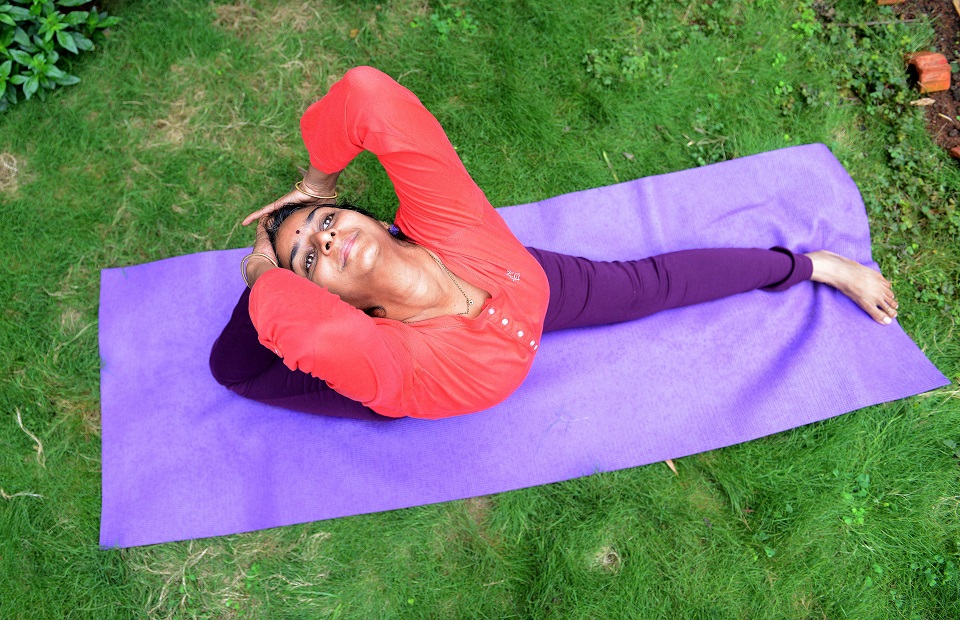Filtered By: Lifestyle
Lifestyle
India bends it like Modi on first World Yoga Day
By ANNIE BANERJI, Reuters

Indian yoga instructor and national champion Sagiraju Anuradha performs the yoga posture 'Poorna asana' in Hyderabad on June 20, 2015. The first International Yoga Day is celebrated on June 21, 2015. AFP PHOTO/Noah Seelam
Yoga-loving Modi led more than 35,000 people, including bureaucrats, students and soldiers, performing poses such as the half camel and cobra in a 35-minute mass outdoor yoga session beginning at 7:00 a.m. (0130 GMT) on a New Delhi boulevard.
Organisers are hoping the event qualifies for the Guinness Book of World Records for the largest yoga class at a single venue.
The current title, according to the Guinness website, was set by 29,973 students in Gwalior, India, in 2005.
"Yoga is more than only physical fitness. We are not only celebrating a day but we are training the human mind to begin a new era of peace," Modi told the crowd at Rajpath avenue.
He thanked the United Nations for adopting his idea for a world Yoga Day.
"This is a program for human welfare, a tension-free world and a program to spread the message of goodwill," said the premier, wearing a crisp white outfit with a national tricolour scarf.
Modi then surprised the crowds by leaving the stage, removing his glasses, and securing a spot at the front of the massive session to mirror the stretches, breathing, and meditative moves beamed on giant screens along the historic avenue.
The prime minister, who credits yoga for his ability to work long hours on little sleep, had been scheduled only to make a speech at the event.
Sea of white
Aerial images taken near dawn showed Rajpath, or King's Avenue—which connects the president's palace with the iconic India Gate monument—as a sea of white with scores of people, clad in new Yoga Day T-shirts, bending and stretching in sync with the English and Hindi instructions.
Central Delhi was sealed off and carpeted, with dozens of metal detectors and multiple checkpoints erected for the big day that saw other VIPs including Delhi Chief Minister Arvind Kejriwal participate.
People in 650 districts across the nation joined in, expected to be joined by yoga enthusiasts in 192 other countries—including in Britain, where mats will be rolled out along the banks of the River Thames.
In his maiden address to the United Nations General Assembly, Modi proposed to dedicate a day devoted to the ancient Indian discipline, prompting the UN to proclaim June 21 as the International Day of Yoga.
Indian scholars believe yoga dates back 5,000 years, based on archaeological evidence of poses found inscribed on stones and references to Yogic teachings in the ancient Hindu scriptures of the Vedas.
And Modi, a vegetarian who practises the art daily, has made Yoga Day a key initiative of his Hindu nationalist government since he took office 13 months ago.
He wants to reclaim yoga as an historical part of Indian culture which has been lost to the West, where it has become a multi-billion-dollar industry.
Since storming to power, the Hindu nationalist premier has set up a ministry dedicated to promoting yoga and other traditional Indian treatments and also started free yoga classes for his government's three million bureaucrats and their families.
Foreign Minister Sushma Swaraj, who is at the UN's headquarters in New York for the day's launch in Times Square, has called yoga "the soft power of India" that can foster world peace.
But the government's push for "yoga for harmony and peace" met with criticism in the run-up to Sunday, with some religious minorities accusing Modi of pushing a pro-Hindu agenda in officially secular India.
A few Muslim groups have complained that chanting the sacred Hindu sound of "Om" during yoga and certain poses, such as "surya namaskar" or sun salutation, have clear Hindu overtones and were against Islam. — AFP
Tags: yoga, internationaldayofyoga
More Videos
Most Popular




